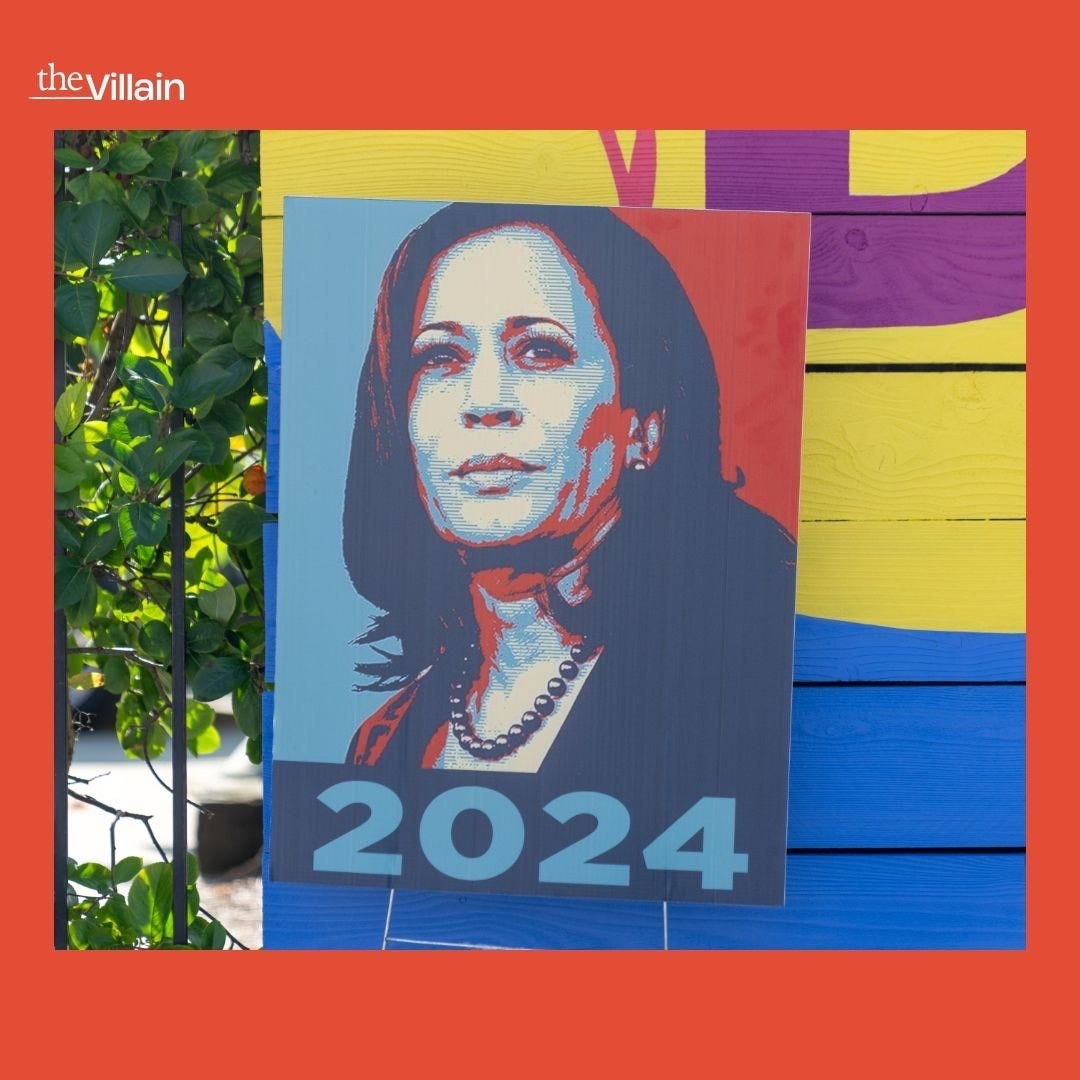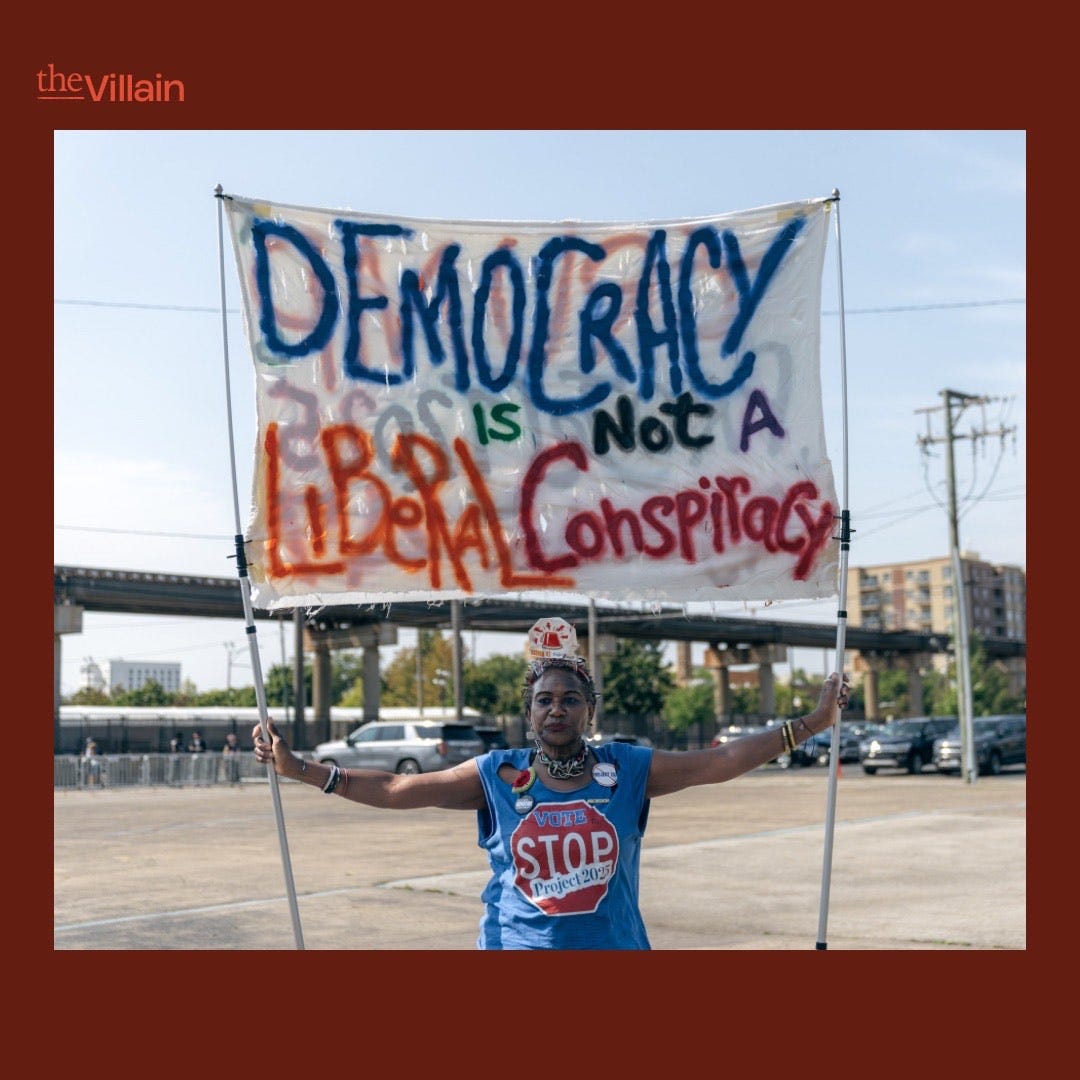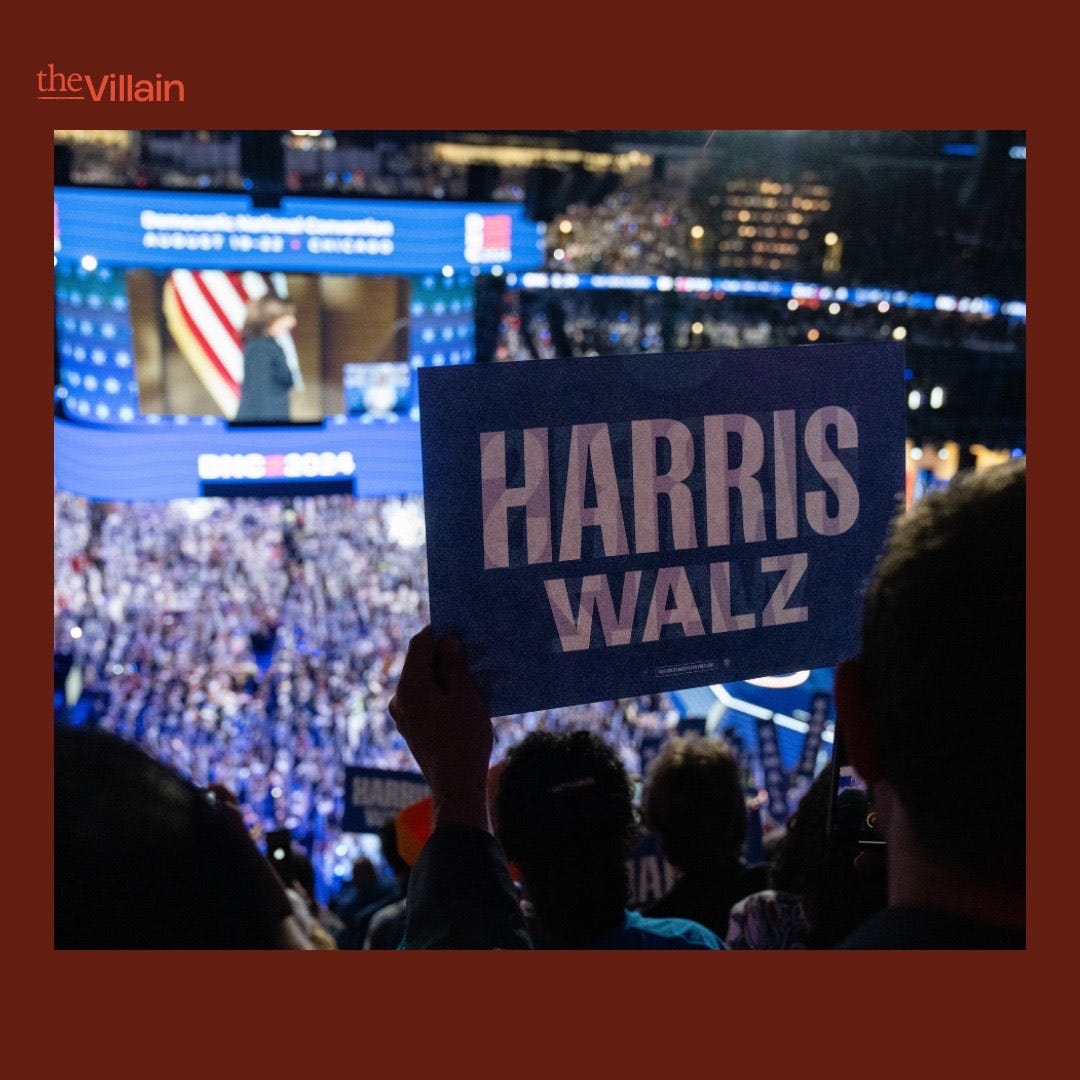“Let us write the next great chapter in the most extraordinary story ever told.” — Vice President Kamala Harris
Last week, the Democratic Party took over the United Center in Chicago to formally nominate Vice President Kamala Harris for President and unveil their blueprint for the future under a potential Harris-Walz administration. Over the course of a marathon four-day convention, replete with speeches and video ads, the convention offered a wealth of content to analyze—and exposed numerous missed opportunities. While some attendees left with renewed optimism, I found myself grappling with mounting frustration. With the election just months away, here are my five critical takeaways from the Democratic National Convention's four-night liberal spectacle.
If you missed my daily recaps, catch up here: Day One, Day Two, Day Three, Day Four.
#1: WHO IS KAMALA HARRIS? WE STILL DON’T KNOW
With an expedited campaign and Harris’s accelerated rise to prominence as Biden’s vice president, this year’s DNC was all about defining Kamala Harris. Yet, despite these efforts, her political identity is still lost on me.
Throughout the convention, we glimpsed at aspects of Kamala’s personal story—her humble beginnings, her mother’s struggle with bigotry, and heck she even mentioned her Marxist father Donald J. Harris who she notoriously never talks about. While it was refreshing to hear these personal narratives, they were overshadowed by a lack of substantive discussion on her political career and policy positions.
Prior to becoming Vice President, Harris had limited political experience and few notable victories. She ran in largely uncontested races and served as a Senator during the Trump administration. Her 2020 presidential campaign ended before the first primary. Additionally, many of her positions have shifted over time. Given this, at the DNC, I anticipated a deeper dive into her policy plans, but what I saw were mostly high-level statements without concrete details.
I realized the campaign’s reluctance to present a clear policy agenda was due to an uncertainty or a strategic hesitance to commit to specific proposals. But this approach only leaves us with a vague sense of Harris’s platform that suggests that she’s as feckless as the Republicans claim, showing a tendency to follow shifting winds rather than offer a definitive policy vision. As a result, the DNC left us with the same broad, uninspired rhetoric and no comprehensive Harris-Walz campaign policy plan.
Maybe she’ll release a full agenda of policies soon, but it doesn’t seem likely we’ll get one before the first presidential debate.
#2: BACK IN THE LIBERAL LION’S DEN, PROGRESSIVISM WAS AT THE BOTTOM OF THE FOOD CHAIN
Leading up to the convention, the Harris campaign saw a notable increase in support and a significant bump in polling numbers, partly due to concerns over Biden’s age and Harris’s younger profile. This shift seemed to be a glimmering light for the progressive constituency of the party.
With Biden stepping down and Tim Walz’s vice presidential selection, it felt like the party was finally acknowledging the left wing’s concerns. However, the DNC quickly made it quite clear that this was just a moment where voter and donor interests aligned rather than a moment where the party had a genuine commitment to advancing progressive ideas.
Kamala Harris is just another clog in the old Democratic machine. Her final speech highlighted her as an empty vessel offering veiled promises of progressivism, rather than being a transformative figure. It seems the party and the campaign don’t fully grasp why Harris gained popularity so quickly in the first place.
As noted, Harris lacks a clear stance, making her a terrifying option who seems to operate at the behest of the democratic party system rather than lead with conviction for her voter for the electorate. Her focus appears to be more on winning elections than on advancing democratic principles.
Throughout the four-day convention, Democrats promoted the notion of “passing the torch.” I must admit, they nearly convinced me—especially with Rep. Alexandria Ocasio-Cortez and Sen. Bernie Sanders speaking on stage. However, it seems their concept of passing the torch is different from mine. Rather than shifting to a more progressive faction, they’re passing it to a younger generation that still upholds the same ideals as the party’s old guard.
And I’m left thinking about the words of a Gen Z delegate that succinctly captured the situation with: “If you’re not at the table, you’re on the menu.” And the democrats have shown that Palestinians, the Uncommitted Movement, and progressive voices are indeed on that menu.
#3: THE DEMOCRATS ARE SCARED OF CUTTING OFF ISRAEL—EVEN WHEN IT’S THE MORALLY CORRECT CHOICE
A deviation from current foreign policy requires an ideological commitment to peace, but even with Kamala Harris’s desire to win there seems to be no desire to move away from the Democratic Party’s traditional stance on Israel.
Despite attempts to present herself as more progressive than Biden regarding the ongoing genocide of the Palestinian people, Harris’s position remains largely unchanged from his. In her closing speech at the convention, her rhetoric closely mirrored Biden's, emphasizing Israel’s right to defend itself and pledging to support this defense unconditionally. In layman’s terms, she’s prepared to continue funding and arming Israel, potentially suggesting her dangerous support for actions like waging war and acting within the Middle East on Israel’s behalf.
Harris’s remarks on the tragic events of October 7th continued to echo Biden’s inaccuracies, including the debunked claim of sexual violence by Hamas, which was later retracted for lack of journalistic evidence. And on the other hand, her brief mention of Palestinian suffering failed to address the brutal treatment of Palestinian detainees by IDF soldiers—some being raped to death.
Her speech was just a confirmation of the Democratic Party’s hierarchy of humanity, prioritizing Israeli lives over Palestinian ones. Although she professed a desire for an immediate ceasefire, it’s clear that she has no real desire to pursue Palestinian liberation without the consent of the oppressor (Israel). Because if she did it’d be as easy as just upholding the law and halting the illegal action of suppling arms to Israel, which the current U.S. administration is not prepared to do.
BONUS: THE FOREIGN POLICY SHACKLES ARE OFF
One of the most jarring moments of the convention was Harris’s call for America to have the “strongest and most lethal” military. While this is not a departure from the rhetoric of past presidents, the verbiage used was notably more aggressive compared to the typical framing of America’s militia as a “strong defensive force.” And the DNC crowd’s enthusiastic chanting of “USA, USA, USA” in response to this line was unsettling, highlighting a disturbing alignment between Kamala Harris and more hawkish elements, including those seen in the Trump administration. This should be a cause for concern.
#4: DEMOCRATS ARE TAKING THEIR VICTORY LAP BUT THE RACE IS STILL TIGHT
The DNC wasn’t just a celebration of Kamala Harris’s historic presidential nomination; it was also a premature celebration of victory. This premature confidence has diminished their responsiveness to constituents and led them to shift toward the center (and even the right) earlier than usual.
Historically, Democratic candidates have portrayed themselves as progressive during campaigns, only to pivot to centrist policies once in power. Barack Obama may be one of the greatest examples of that, transitioning from an hopeful progressive candidate to a centrist president. With Kamala Harris, it feels like the party is just replaying the 2008 Obama playbook except with an earlier and more pronounced swing moderate swing, and with someone with far less charisma.
They think they can “Brat summer” and “coconut tree” their way to an electoral victory—assuming they can coast to victory without fully acknowledging the progressive base that helped them get this far. Meanwhile, the Republicans are literally throwing this election making every possible misstep, which are inadvertently boosting Harris’s numbers. So unfortunately Harris probably will win, and if she wins, the democrats will only be emboldened further to shift toward the center and right.
BONUS: DONORS ARE THE REAL CONSTITUENCY IN POLITICS
Biden’s decision to step down and Tim Walz’s selection were influenced by donor pressure, which often drives party decisions more than voter pressure. So while voter and donor interests occasionally align like in this moment, donor influence is a major reason why Democrats frequently adopt moderate stances—these donors are often those who would be affected by progressive policies like higher taxes on the wealthy. Their messaging hinges on our votes, but their policy hinges on the support of financial backers. This disconnect between messaging and policy is what dissuaded many from the party and partially why there was a sizeable number of Obama to Trump voters in 2016.
#5: THERE IS NO FREE WORLD—GET USED TO IT
Since the 1940s, America has been branded as the leader of the “free world,” a title bestowed upon it for its supposed commitment to democracy and opposition to authoritarianism around the globe. However, it's becoming increasingly clear that the U.S. government may lack the capacity to fulfill this role, if it ever truly did.
The U.S. has wielded its geopolitical influence to promote its version of democracy, but this effort has often been more about advancing its own interests than genuinely supporting democratic values. The rise of right-wing leaders and authoritarianism abroad, alongside our domestic struggles, might be evidence that this approach has failed—or perhaps it’s working exactly as intended.
I've long argued that the U.S. has one party with two faces rather than two distinct parties. This notion was underscored by Kamala Harris's recent speech, which was arguably one of the most conservative ever delivered at the DNC. It highlighted the troubling reality that whether under Harris or Trump, we’re heading towards greater authoritarianism—just at different speeds. Republicans are openly driving the country towards fascism, while Democrats feign opposition but often mirror similar policies. Republicans arm Israel to support its Palestinian genocide; Democrats do the same but claim to advocate for Palestinian freedom.
The DNC’s portrayal of Harris’s campaign as a beacon of joy and diversity masks a troubling reality that both parties share a similar framework of white supremacy. Despite the party’s claims of inclusivity, they excluded Palestinian American voices. Out of 211 speeches over four days, none were given by Palestinian Americans, despite multiple requests from the Uncommitted Movement. In contrast, an IOF family, cops, former Republicans, and more were given a platform.
As Abbas Alawieh of the Uncommitted Movement reminded us on social media, the DNC has a history of excluding marginalized voices, recalling the 60-year-old refusal to seat Fannie Lou Hamer and the Mississippi Freedom Democratic Party. While the DNC may appear more inclusive now compared to the past, both parties fundamentally embody American chauvinism.
So when confronted with the idea that refusal to commit to supporting Kamala Harris equates to supporting Trump and should be avoided at all costs, my response is simple: Why should I care? Worrying about choosing between Harris and Trump feels like rearranging the deck chairs on the Titanic while the boat continues to sink.









